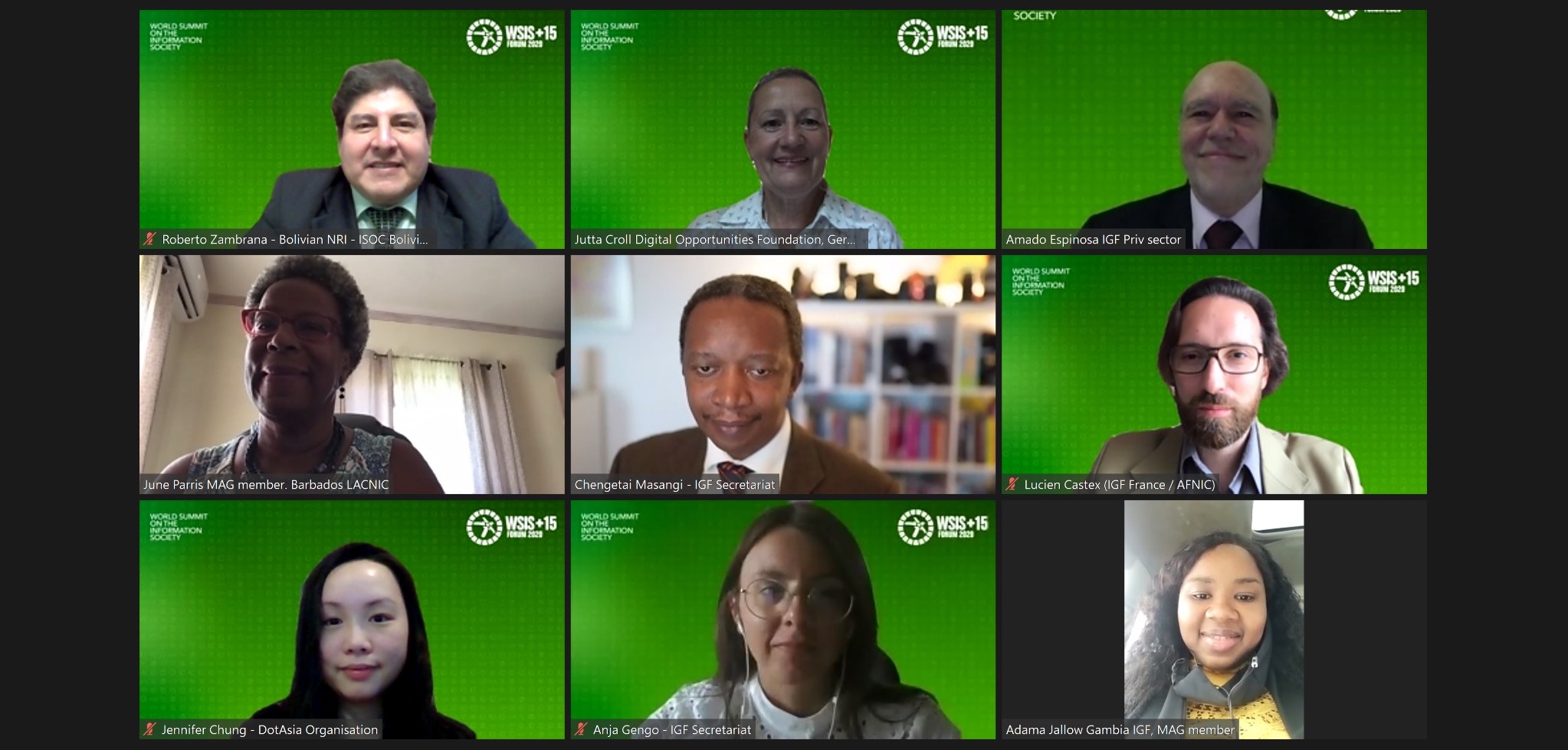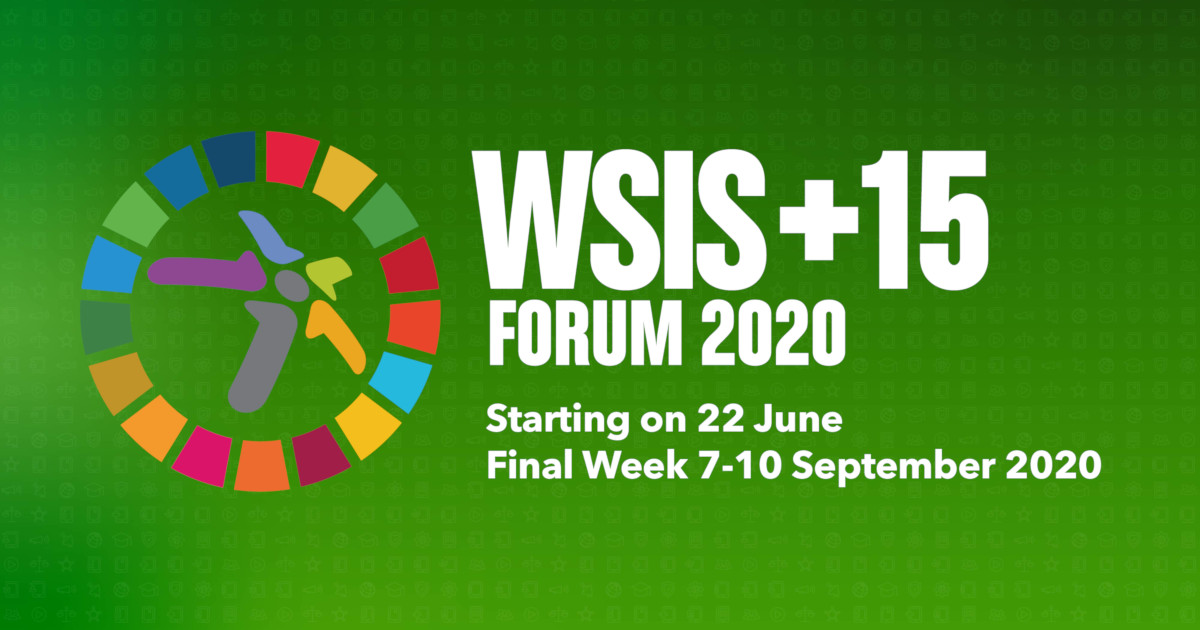IGF Outreach Event
IGF Secretariat
Session 245
The Internet Governance Forum was one of the major outcomes of the original WSIS, as outlined in the Tunis Agenda. The IGF mandate was also renewed for another 10 years during the United Nations General Assembly WSIS+10 Review High-Level Meeting. The Forum, originally convened by the United Nations Secretary-General in 2006, is a process that brings people from all stakeholder and regional groups as equals to discuss matters pertaining to Internet governance. Each IGF cycle is concluded with an annual meeting hosted by a different government. Fourteen annual IGF meetings have been held since 2006.
The IGF Multistakeholder Advisory Group (MAG) advises the UN Secretary-General on the programme and schedule of the annual meeting. The process is institutionally supported by the IGF Secretariat, based at the UN Office at Geneva and the UN Department of Economic and Social Affairs (DESA) based in New York.
IGF 2020
Due to the COVID-19 pandemic, the 15th annual IGF meeting will be hosted online by the UN. The programme is being planned around four main thematic tracks: (1) Data; (2) Environment; (3) Inclusion; (4) Trust.
It is expected that the agenda will feature over 200 sessions, organized by different multistakeholder teams. In addition, four Best Practice Forums (BPFs), 19 Dynamic Coalitions (DCs) and 131 national, regional and youth IGF initiatives (NRIs) will bring their outcomes on various subject matters for further discussion.
The meeting will also include a virtual IGF Village of over 70 exhibition booths and several social events for networking purposes.
Objectives of the session
This session will outline the benefits of active participation at the 15th annual IGF meeting and beyond in future IGF processes. It will explain the concept of the best practice forums (BPFs), dynamic coalitions (DCs) and national, regional and youth IGF initiatives (NRIs). Finally, the MAG 2021 Renewal will be brought to the participant's attention, as well as the future host Governments of the IGF.
Given that the IGF is almost halfway through its second 10-year mandate, the panelists will reflect on what has been achieved in the past five years regarding the IGF's mandated objectives.
Agenda
- Introduction (Mr. Chengetai Masango)
- Overview of the 2020 process (Ms. Anriette Esterhuysen)
- IGF Intersessional Work
- National, Regional and Youth IGF initiatives (Ms. Jennifer Chung) (6 min)
- Best Practice Forums (Ms. June Paris/Mr. Lucien Castex) (6 min)
- MAG Working Groups (Mr. Roberto Zambrana/Mr. Amado Espinosa) (6 min)
- Dynamic Coalitions (Ms. Jutta Croll) (6 min) - Virtual IGF 2020
- Overall structure and format (Ms. Anja Gengo) - IGF 2020 in the context of strengthening digital cooperation
- Discussion from the floor (Ms. Anriette Esterhuysen)
-
 C4. Capacity building
C4. Capacity building
-
 C11. International and regional cooperation
C11. International and regional cooperation
The Internet Governance Forum, as one of the major outcomes of the original WSIS, is mandated by the Tunis Agenda for the Information Society, to facilitate discourse between all stakeholders on international public policies regarding the Internet, as well as to serve as an interface with appropriate intergovernmental organizations and other institutions on matters under their purview. The Forum further is mandated to strengthen and enhance the engagement of stakeholders in existing and/or future Internet governance mechanisms, particularly those from developing countries; as well as to contribute to capacity building for Internet governance in developing countries, drawing fully on local sources of knowledge and expertise.
-
 Goal 4: Ensure inclusive and equitable quality education and promote lifelong learning opportunities for all
Goal 4: Ensure inclusive and equitable quality education and promote lifelong learning opportunities for all
-
 Goal 5: Achieve gender equality and empower all women and girls
Goal 5: Achieve gender equality and empower all women and girls
-
 Goal 7: Ensure access to affordable, reliable, sustainable and modern energy for all
Goal 7: Ensure access to affordable, reliable, sustainable and modern energy for all
-
 Goal 8: Promote inclusive and sustainable economic growth, employment and decent work for all
Goal 8: Promote inclusive and sustainable economic growth, employment and decent work for all
-
 Goal 9: Build resilient infrastructure, promote sustainable industrialization and foster innovation
Goal 9: Build resilient infrastructure, promote sustainable industrialization and foster innovation
-
 Goal 17: Revitalize the global partnership for sustainable development
Goal 17: Revitalize the global partnership for sustainable development
At the IGF, participants discuss various aspects of digital public policy with an aim of having everyone connected in a safe and secure online environment. The Forum discusses various means of deployment of digital technologies for wellbeing of all people, with a clear understanding that digital technologies are an accelerator of a sustainable development and a mechanism for achieving the 2030 Agenda for Sustainable Development.

.jpeg)
.jpeg)
.jpeg)
.jpeg)
.jpeg)
.jpeg)
.jpeg)
.jpeg)
.jpeg)
.jpeg)

